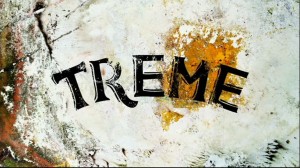
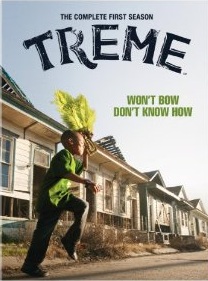 BUY FROM AMAZON: CLICK HERE!
BUY FROM AMAZON: CLICK HERE!
STUDIO: HBO Home Video
MSRP: $59.99
RATED: Unrated
RUNNING TIME: 632 minutes
SPECIAL FEATURES:
- 10 Musical Commentaries
- 5 Audio Commentaries
- 2 Behind-the-Scenes Featurettes and more
The Pitch
Create an HBO ensemble drama about music, community, and dealing with the aftermath of Hurricane Katrina, one of the worst natural disasters in American history. Add in John Goodman!
The Humans
Created by David Simon (The Wire, Homicide: Life On the Street)
Wendell Pierce, Clarke Peters, Steve Zahn, Melissa Leo, John Goodman, Rob Brown, Lucia Micarelli, Michiel Huisman, Khandi Alexander, Kim Dickens
The Nutshell
The sometimes intertwined lives of people in New Orleans, circa-2005, coping with the devestation that Katrina hath wrought.
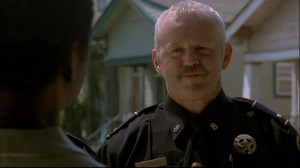
"The son of a bitch writing this review made a Hack joke not too long ago, and i'm here to kick his ass."
The Lowdown
There’s a quote during the first episode of Treme (pronounced “tre-may”, named after the predominantly African-American neighborhood just above the French Quarter in the city of New Orleans) that I think sums it up perfectly. One character says to another character, “You mean you’re gonna tell me that all you wanna do is get high, play some trumpet, and barbecue in New Orleans your whole damn life?”, to which the character responds, “That’ll work….”. It speaks to the simple yet contented nature of the people of New Orleans, or at least how Treme portrays them. No, it’s not that they wanna just sit around smoking pot and eating all day, which some of them on the show do. It speaks to the nature of the show, the spirit of the people, and the will to rebuild their lives in the face of adversity that no one could have anticipated. The series begins 3 months after Katrina. Music is the soul and salvation of good ol’ Nawlins’ as members of a marching band parade down the street amidst wrecked cars and debris. In fact this show is almost all about music. It’s the beating heart of it and feels present in almost every scene. Quite literally, almost every other scene is infused with some sort of musical instrument, be it a trumpet, trombone, or piano. The music is wonderful, and every bit a character in the show as anyone else. It’s how people cope, it’s their lifeblood and their livelihood and if not for music, there’s no way these people would have gotten by after the storm. It brings people together like nothing else, and if this show was the only thing to go on, and if New Orleans was a fictional city, you would believe without a doubt that a place like this could exist on that magic of music alone. People are simply too happy when blowing on their horns or listening to those horns, and it’s almost as if troubles disappear before their very eyes. And in every single episode, I defy you to not tap your foot or bob your head during one of the many songs that are played. Not to mention, the opening theme is excellent. Footage of Katrina devestation (think water damage) is mixed with stock footage of the old days of New Orleans and it’s excellent. The theme song is tremendously catchy, and I dare you to fast forward through it. It’s impossible.
Wendell Pierce. The great, immaculate, detective Bunk Moreland from The Wire is here playing Antoine Batiste, a down-on-his-luck-but-getting-by (but who isn’t in post-Katrina New Orleans?) struggling trombonist. He lost his house in the storm and it also left him without a car, and so his only means of transportation from gig to gig is using a taxi, which he frequently can’t pay the complete fare for and promises to “get him next time”. He’s really trying to get his life back on track. He desperately searches for gigs, needing the money to help his girlfriend with the bills and to support their newborn baby, a child which is his fourth between 3 different women. His two more grown sons live with his ex-wife, LaDonna, and her husband, an affluent dentist. He doesn’t get to see them very much, and wants to be some kind of father to them even though his lot in life makes it hard. He sometimes needs to take gigs on Bourbon Street, which is looked down upon by certain musicians because of how “tourist-y” and not real it can be. But as people frequently remind Antoine, there’s “pride on Bourbon Street!”. A gig is a gig when you need to put food on the table, right? Tourists be damned.
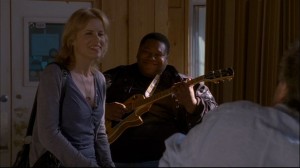
Santa Claus in New Orleans is a lot different than you're used to.
Another veteran of The Wire, Clarke Peters (who played Lester Freamon) is here playing Albert “Big Chief” Lambreaux. His nickname is “Big Chief” because he is a Mardi Gras Indian chief, and very well-respected in the community. He hasn’t been home for months, and like a lot of Katrina victims discovers his house in a state of near-ruin. He then goes to the neighborhood bar where he and his fellow Indians, carrying on African-American tradition, gathered to practice. No one has been there since the storm, so he takes it upon himself to restore the space as best he can and begins the slow process of restoring his tribe to function as they did before the storm. The Indians dress up in traditional Native American ceremonial garb (big and colorful) and dance around the streets all crazy-like, spouting out all kinds of chants. This tradition is important to him and his faithful and getting them back together is what he cares about most. I wasn’t familiar with this tradition at all, but it’s great. His son, Delmond (Rob Brown), is a big up-and-coming jazz musician in New York who for the most part has left his native music and town behind and comes home to New Orleans reluctantly when he learns that his father has gone off the rails with his idea of reviving the tribe. He thinks it’s silly, even though it means a lot to his father, and despite these feelings ends up going back and forth between NY and New Orleans to help his father restore the tribe when he can.
Melissa Leo and John Goodman play Creighton and Toni Bernette. Toni is a civil rights lawyer, and boy has her plate been full since Katrina. She helps victims of the storm locate loved ones, and she helps citizens deal with the bullshit forced down their throats by the state of New Orleans and the federal government. Local authorities hate her, and she’s lovingly referred to by one cop as a cunt. Her main objective this first season is helping LaDonna locate her lost brother, who was a prisoner during Katrina and who has been missing ever since the storm. She tries to do everything to locate him, and whether or not the hopelessly backlogged court system is going to cooperate with this search is another matter entirely. Creighton is an author and college professor, based on real life blogger Ashley Morris, who was very vocal about the government and its involvement (or lack thereof) in Katrina and unfortunately passed away in 2008. The portrayal by John Goodman is vocal and boisterous and very passionate. The man hates what has happened to his city, and begins video blogging on this new site (yes, it’s 2005) called “YouTube”. He becomes something of a sensation and people begin recognizing him everywhere. He hates how New Orleans has been virtually ignored, a city that the government apparently had no interest in rebuilding. His tirades on YouTube give birth to a catchphrase of sorts: “Fuck you, you fucking fucks!”. It gets the point across, i’d say.
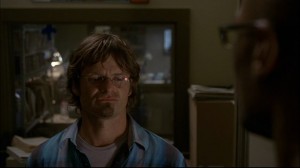
"Soooooo...this being a show about music and all, that means I can sing 'That Thing You Do', right?"
Steve Zahn plays Davis McAlary and is the only character you’d really refer to as comic relief, even though the character is much deeper than that. He’s a funny guy who makes it a point to blast any and all kinds of music out of his window to anger his gay neighbors whom he’s convinced has called the cops on him before. He’s got anger management issues and he’s a musician/DJ/layabout. He has an on-again, off-again relationship with Janette Desautel (Kim Dickens), who is a chef with her own restaurant. She’s been struggling to make ends meet ever since Katrina and frequently has to worry about where the money is going to come from in order to pay merchants that supply her with meat and seafood. Since the insurance money from the storm hasn’t kicked in for her and many New Orleans residents, she has to occasionally ask her parents for money.
Annie (Lucia Micarelli) and Sonny (Michiel Huisman) are buskers, also known as street musicians, and also live together. They make their living playing in the French Quarter, often attracting tourists who have no idea what New Orleans is all about, or think they do, and are only there because a tragedy has befallen the city. Sonny sardonically asks a group of teenagers helping out with cleanup in the 9th Ward with their church group if they had ever even heard of the 9th Ward before the storm. Sonny plays a keyboard, and Annie plays the violin. Sonny is a former user who has been clean and sober for awhile, and both he and Annie are transplants from New York just trying to make their way in the city. They inadvertently cross paths with some of the other characters along the way. Annie spends time with Davis on a whim during Mardi Gras, and both Annie and Sonny are there when Antoine gets picked up by the cops after he stumbles out of a bar and runs into them. He sings a few bars while they play, and then scratches a police car with his trombone by accident as he walks away. The cops then arrest him for public intoxication. When he doesn’t drop his trombone right away (which they insanely consider a weapon) they beat him, which speaks to the uneasy police state that was left after the storm.
Music is very much the heart and soul of this show. In fact, it’s the everything. New Orleans is, of course, pretty much the birthplace of jazz. And you’d be hard-pressed to find a stretch of 10 minutes in this show where music isn’t assaulting your ears. And frankly, that’s a damn good thing. The city of New Orleans lives and breathes with the soulful jazz present in almost every scene. Except for just a few of the main characters, almost everyone is somehow involved in making or playing music. There are also a whole slew of musical cameos in this first season, and i’m sure as the show goes on there will be many more to come. Now, i’m pretty naive when it comes to a lot of different kinds of music, but the musical cameos include Allen Toussaint, Kermit Ruffins, Elvis Costello (I at least know who he is!), Steve Earle, The Pine Leaf Boys, and the list goes on. 99% of the music being played all the time is jazz, and it’s extremely pleasing to the ear. I haven’t been able to actually figure out who’s playing most of the music when some of the main characters play their instruments, since i’m pretty damn sure they didn’t learn to play that great just for this show, but it doesn’t matter because it sounds genuinely like it’s coming straight from them, so the wool is pulled over my eyes and I don’t care. This show makes me appreciate the hell out of the music that’s out there.
Now, without spoiling a thing, there’s something that happens towards the tail end of the season that I downright did not see coming, and it really floored me. You’ll know exactly what I mean when you see it, but it’s definitely a shock. It was strange to see in a show like this, where the plot develops a little more gradually than in most shows. There’s a sense here that the real drama has already happened, that being the storm, and knowing what these people went through before we see them is sometimes enough, especially when we see how they’re dealing with their lives. It isn’t a show of big twists or shocking developments; it’s simply about people moving on and adapting to a life they never expected and did not deserve. And the fact that the show is shot on location really adds to the allure of the Treme itself, because we aren’t seeing props or all manufactured destruction, even though there are some liberties taken in recreating disaster scenes where areas have recovered; this is mostly the real deal, right where the characters live and breathe. It’s as real as TV can get and it’s wonderful at every turn. I’m sure there are those out there that don’t feel it’s 100% accurate but I don’t think anyone could possibly do better with this source material than David Simon. And this is a David Simon show, through and through. I implore you to pick this up and really embrace a great, important piece of television.
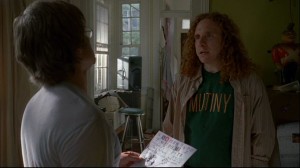
"Stop calling me 'Hipster Irish Kenny G'. I'll pick my own damn stage name."
The Package
Traditional commentaries for all 10 episodes, and musical commentaries for 5 episodes. The musical commentaries are, appropriately enough, commentaries on the scenes in the episodes when music is being played. It’s pretty interesting to have a feature like this, and adds a lot to the musical performances in the show, of which there are a TON over just a 5 episode span. The featurettes are really good, as you’d expect from HBO. The Making of Treme focuses on the characters, while Treme: Beyond Bourbon Street focuses on the history of New Orleans and mainly the Treme itself. It’s a really fascinating look at the history of the city, and it makes you realize just how much of a character the Treme is in the show. The funeral traditions, as witnessed in the show, are incredibly interesting. You wouldn’t think of dancing and playing music in the street right after a burial, but it’s how they cope and honor the dead. Music really does act as therapy in the Treme.
Rating: 




Out of a Possible 5 Stars